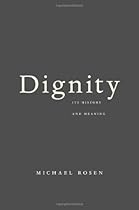Read Dignity: Its History and Meaning by Michael Rosen Online
[Michael Rosen] ✓ Dignity: Its History and Meaning ✓ Download Online eBook or Kindle ePUB. Dignity: Its History and Meaning Challenging current orthodoxy, Rosen’s interpretation presents Kant as a philosopher whose ethical thought is governed, above all, by the requirement of showing respect toward a kernel of value that each of us carries, indestructibly, within ourselves. This is why users of the word nowadays often talk past one another. Dignity plays a central role in current thinking about law and human rights, but there is sharp disagreement about its meaning. The idea of dignity as the foundation for the

| Title | : | Dignity: Its History and Meaning |
| Author | : | |
| Rating | : | 4.71 (817 Votes) |
| Asin | : | 0674064437 |
| Format Type | : | paperback |
| Number of Pages | : | 200 Pages |
| Publish Date | : | 2013-02-23 |
| Language | : | English |
"Great Overview" according to David Walsh. This is a fine example of the best contemporary scholarship in political theory. It is informed by philosophical argument, yet Rosen does not limit himself to the analysis of concepts. He recognizes that they play a role in political life before anyone raises the question of their meaning and signi. Sevens said Not Supremely Dignified. This book briefly deals with Dignity. It does identify four strands of it: (1) dependent on status [dignity of status], ("Not Supremely Dignified" according to Sevens. This book briefly deals with Dignity. It does identify four strands of it: (1) dependent on status [dignity of status], (2) gravitas [dignified behavior], (Not Supremely Dignified This book briefly deals with Dignity. It does identify four strands of it: (1) dependent on status [dignity of status], (2) gravitas [dignified behavior], (3) intrinsic (human) dignity. I didn't list the fourth one because I'm not at all convinced that it is actually a fourth one, despite claims to. ) intrinsic (human) dignity. I didn't list the fourth one because I'm not at all convinced that it is actually a fourth one, despite claims to. ) gravitas [dignified behavior], (Not Supremely Dignified This book briefly deals with Dignity. It does identify four strands of it: (1) dependent on status [dignity of status], (2) gravitas [dignified behavior], (3) intrinsic (human) dignity. I didn't list the fourth one because I'm not at all convinced that it is actually a fourth one, despite claims to. ) intrinsic (human) dignity. I didn't list the fourth one because I'm not at all convinced that it is actually a fourth one, despite claims to. "not fluffy" according to Paul Beckel. It's dangerous when ideas are elevated to such heights that we don't bother to understand them. Dignity is one of those things, I fear--so obvious I've never thought to ask what it means.Rosen looks at dignity through some interesting lenses--from dwarf-tossing to satire to the Catholic Church's ev
Challenging current orthodoxy, Rosen’s interpretation presents Kant as a philosopher whose ethical thought is governed, above all, by the requirement of showing respect toward a kernel of value that each of us carries, indestructibly, within ourselves. This is why users of the word nowadays often talk past one another. Dignity plays a central role in current thinking about law and human rights, but there is sharp disagreement about its meaning. The idea of dignity as the foundation for the universal entitlement to human rights represented the coming together after the Second World War of two extremely powerful traditions: Christian theology and Kantian philosophy. Finally, Rosen asks (and answers) a surprisingly puzzling question: why do we still have a duty to treat the dead with dignity if they will not benefit from our respect?. Not only is this idea of dignity as an “inner transcendental kernel” behind human rights problematic, Rosen argues, it has drawn attention away from a different, very important, sense of dignity: the right to be treated with dignity, that is, with proper respect. Combining conceptual precision with a broad historical background, Michael Rosen puts these controversies in context and offers a novel, constructive proposal.Drawing on law, politics, religion,
. Michael Rosen is Professor of Government at Harvard University
His easy, conversational style and pointed avoidance of jargon invite the educated lay reader into a culturally relevant and interesting conversation. (John Gallagher The Guardian 2012-03-25)An elegant, interesting and lucid exploration of the concept of dignityDrawing on classical, liberal and Catholic traditions, Rosen hopes to rehabilitate dignity to its rightful place near the centre of moral thoughtRosen's admirable book deserves wide attention from political theorists, jurisprudes and political philosophers. (Publishers Weekly 2011-12-31)With this book Michael Rosenadds a new voice to the defense of the
Download Dignity: Its History and Meaning
Download as PDF : Click Here
Download as DOC : Click Here
Download as RTF : Click Here
